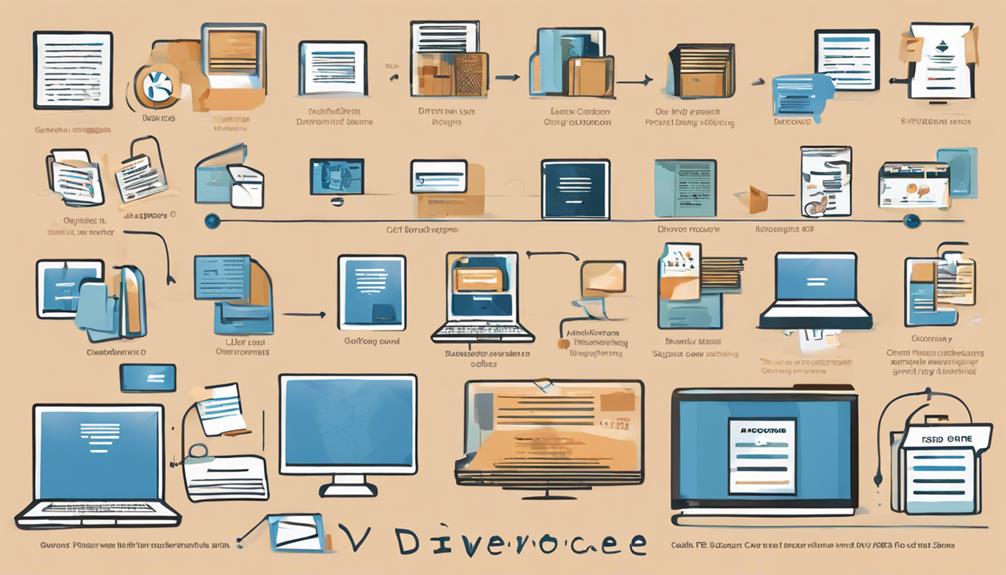When it comes to navigating the process of expediting a divorce in Connecticut, we have created a practical roadmap to help streamline your journey.
From understanding the initial steps to finalizing the necessary paperwork, each stage is crucial in ensuring a smooth and efficient divorce process.
By following these ten steps meticulously, you can significantly reduce the time and complexities typically associated with divorces.
Ready to explore how you can expedite your divorce process in CT?
Key Takeaways
- Engage a knowledgeable attorney early to prevent errors and streamline the process.
- Detail grounds accurately and provide clear information for a smooth filing.
- Choose the right server, exchange financial information promptly, and avoid delays.
- Seek legal guidance for child custody negotiations, prioritizing the child's well-being.
Understanding CT Divorce Process
Understanding the CT divorce process is crucial for navigating the complexities of ending a marriage in Connecticut efficiently and effectively.
In Connecticut, nonadversarial actions offer an expedited route for divorce proceedings, allowing couples to bypass lengthy waiting periods. Eligibility conditions and joint petition requirements must be met for this streamlined process. A significant advantage of nonadversarial actions is the potential to obtain a final divorce decree without a hearing, circumventing the usual 90-day wait. However, court review remains a pivotal step in confirming the dissolution of marriage.
Settlement agreements play a key role in this process, necessitating fairness and equity. Should any agreements be deemed unjust, the court can intervene to ensure a just outcome.
Understanding the nuances of the Connecticut divorce system, particularly regarding nonadversarial actions, settlement agreements, and court review, is fundamental to achieving a swift and satisfactory resolution.
Initiating Marital Dissolution

When filing for divorce in Connecticut, it's essential to complete the necessary paperwork. This includes the summons, complaint, and automatic orders form. The responding spouse should be provided with an appearance form to fill out and potentially file an answer or cross-complaint.
Engaging a knowledgeable attorney early on can help prevent mistakes and streamline the entire process for a quicker resolution.
Filing Divorce Petition
Initiating the marital dissolution process in Connecticut requires filing a divorce petition with the court, a crucial step that officially commences the legal proceedings to end the marriage.
When completing the divorce petition, it's essential to detail the grounds for divorce accurately and specify the relief sought. Providing clear and concise information in the petition sets the foundation for a quick divorce process in Connecticut.
This formal document serves as your request to the court for a divorce and outlines the issues that need resolution. By approaching the filing of the divorce petition meticulously and in compliance with Connecticut's requirements, you pave the way for a smoother and expedited dissolution of your marriage.
Serving Spouse With Papers
To ensure a smooth initiation of the marital dissolution process in Connecticut, serving your spouse with divorce papers is a critical step that must be carried out correctly and promptly. Proper service of process is essential to expedite a divorce. Here are four key points to consider:
- Choose the Right Server: Ensure the papers are served by a state marshal or a person over 18 who isn't involved in the case.
- Notify Your Spouse: Serving the papers officially notifies your spouse of the divorce proceedings.
- Avoid Delays: Incorrect service of papers can lead to unnecessary delays in the divorce process.
- Deliver Required Documents: Make sure to include copies of the summons, complaint, and other relevant documents when serving your spouse.
Exchanging Financial Affidavits
Let's talk about the crucial step of exchanging financial affidavits in your divorce process.
These documents provide a detailed snapshot of each party's financial situation, including income, expenses, assets, and debts.
Ensuring accurate and timely submission of these affidavits is essential to maintain transparency and fairness throughout the proceedings.
Required Financial Documentation
Gathering and exchanging financial affidavits is a crucial step in ensuring transparency and fairness throughout the divorce process in Connecticut.
Here are four key aspects to consider when dealing with required financial documentation:
- Detailed Financial Affidavits: Include comprehensive information on assets, debts, income, and expenses.
- Bank Statements and Tax Returns: Provide accurate records of all financial accounts and tax filings.
- Investment Accounts: Disclose details of any investments, including stocks, bonds, and retirement accounts.
- Property Valuations: Obtain appraisals or assessments for any real estate or valuable assets to facilitate equitable division.
Timely Submission Deadlines
Ensuring timely exchange of financial affidavits is a critical aspect that underpins the efficiency and fairness of the divorce process in Connecticut. Parties have a strict deadline of 30 days from filing to exchange these crucial documents. Missing this deadline can lead to court sanctions and unnecessary complications.
Adhering to this timeframe is essential for a smooth and expedited divorce process. By submitting financial affidavits on time, both parties contribute to the transparency and integrity of the proceedings. This deadline serves as a safeguard, ensuring that all relevant financial information is disclosed promptly.
Therefore, meeting this requirement isn't only a legal obligation but also a strategic move towards a timely resolution of the divorce.
Negotiating Child Custody

When negotiating child custody in Connecticut, parents prioritize the well-being and best interests of their child. Here are some key steps to consider:
- Understand Custody Types: Legal custody grants decision-making authority, while physical custody determines where the child resides.
- Calculate Support Obligations: Utilize the Connecticut Child Support Guidelines Worksheet to determine child support obligations based on custody arrangements.
- Consider Mediation: Opting for mediation can assist in reaching agreements on child custody and support outside of court, fostering a more collaborative process.
- Seek Legal Guidance: Consulting with an experienced attorney specializing in family law can provide invaluable support and expertise in navigating the complexities of child custody negotiations effectively.
Impact on Divorce Length

Navigating the complexities of financial situations during a divorce in Connecticut can significantly impact the duration of the process. Proper handling of financial information, such as child support calculations and property division, is crucial. Cases involving a higher number of children may introduce additional complexities, potentially prolonging the divorce proceedings. When intricate financial matters come into play, extra steps may be necessary, leading to a longer process. To streamline this, engaging a skilled mediator can expedite the divorce by facilitating agreements and efficiently resolving conflicts.
Efficiently finalizing the divorce with all issues resolved is paramount in minimizing the length of the process in Connecticut. By ensuring that financial aspects like child support and property division are addressed promptly and accurately, couples can expedite their divorce proceedings. Strategic planning and attention to detail in handling financial information can significantly impact the overall length of the divorce process.
Attorney's Role in Divorce

Having a skilled attorney by your side can make all the difference in expediting your Connecticut divorce process. They provide valuable legal guidance, streamline the mediation process, and offer crucial assistance with paperwork.
Understanding the importance of an attorney's role in your divorce can help you navigate the complexities of family courts with confidence and efficiency.
Legal Guidance Benefits
With Dolan Divorce Lawyers, clients benefit significantly from the essential legal guidance provided by their experienced attorneys throughout the Connecticut divorce process. Here are four key advantages of seeking legal assistance:
- Navigating Family Law Complexities: Our attorneys can skillfully navigate the intricate nuances of family law in Connecticut.
- Assistance with Paperwork: We offer valuable help with the necessary paperwork, ensuring accuracy and completeness.
- Consultation for Guidance: Scheduling a consultation with our seasoned attorney can provide you with expert guidance tailored to your specific situation.
- Error Prevention: Seeking help from a skilled attorney is crucial to avoid costly errors during the divorce process.
Our team is dedicated to providing you with the experienced guidance you need within the legal system.
Mediation Process Overview
In the mediation process, our attorneys actively support clients by providing essential legal advice and guidance to navigate negotiations and facilitate agreements between divorcing spouses. Mediation involves a neutral third party facilitating negotiations, helping couples communicate effectively, focus on key issues, and work towards mutually acceptable solutions. Attorneys play a crucial role in this process, recommending mediation to expedite the divorce proceedings and promote a cooperative resolution. This approach can save time and money compared to litigation, offering a more amicable way to resolve divorce issues. By leveraging our expertise in mediation, we help divorcing spouses reach agreements efficiently and effectively.
| Mediation Process Overview | ||
|---|---|---|
| Neutral third party facilitates negotiations | Attorneys provide legal advice | Effective communication between parties |
| Focus on key issues | Work towards mutually acceptable solutions | Promote cooperative resolution |
Paperwork Assistance Importance
Navigating the intricate landscape of divorce paperwork can be overwhelming, but with the guidance and expertise of skilled attorneys, the process can be streamlined effectively. Here are four reasons why attorneys play a crucial role in the divorce process:
- Expertise: Attorneys understand the legal requirements and can ensure all paperwork is completed accurately.
- Efficiency: Skilled attorneys can assist in preparing and filing essential documents, expediting the divorce process.
- Error Prevention: Seeking help from an experienced attorney can help avoid mistakes in paperwork, preventing delays.
- Compliance: A seasoned attorney can provide valuable support in organizing and submitting paperwork, ensuring compliance with legal requirements.
With the support of knowledgeable attorneys, managing divorce paperwork becomes more manageable and less stressful.
Filing for Divorce in CT

Successfully navigating the process of filing for divorce in Connecticut requires meticulous attention to detail when completing and submitting the necessary legal forms.
To file for divorce in Connecticut, you must submit a summons, complaint, and automatic orders form. It's important to ensure that the responding spouse is provided with a blank appearance form to fill out.
Seeking assistance from a skilled attorney can be crucial in avoiding errors during the filing process. Filing for divorce is the initial step that sets the stage for further legal proceedings.
Properly completing and submitting the required paperwork is essential for moving forward with the divorce process in Connecticut. By carefully following the guidelines and double-checking all documentation, you can help expedite the divorce process and work towards a quick resolution.
Gathering Financial Information

When gathering financial information for your divorce proceedings in Connecticut, meticulously compile details of all assets, debts, income sources, and insurance policies to ensure a transparent and efficient process.
Here are the essential steps to take:
- Compile Asset Inventory: Document all assets, including real estate, vehicles, bank accounts, retirement funds, and investments to provide a comprehensive overview of your financial standing.
- Gather Debt Information: Collect details on debts like loans, mortgages, credit card balances, and any other financial obligations to address these aspects during the divorce proceedings.
- Document Insurance Policies: Provide documentation for insurance policies, such as health, life, auto, and property insurance, to ensure adequate coverage and protection post-divorce.
- Organize Income Sources: Share information on various income sources, such as salaries, bonuses, investments, rental income, and other financial inflows, to establish a clear picture of your financial resources.
Options for Divorce

Considering the various options available for divorce in Connecticut can help couples navigate the process with clarity and efficiency. Understanding the differences between uncontested divorce, litigation, mediation, and collaborative divorce is crucial in determining the best approach for your situation.
Uncontested divorce is ideal when both parties agree on all terms without court involvement, making it a faster and more cost-effective option. On the other hand, litigation involves legal representation for each spouse in court, which can lead to a lengthier and more adversarial process for contested issues.
Mediation offers a neutral mediator to facilitate discussions and help couples reach agreements on divorce terms amicably. Collaborative divorce takes a team-oriented approach, involving various professionals to find creative solutions that benefit both parties.
Serving Divorce Papers

Navigating through the intricacies of divorce procedures in Connecticut, one crucial step involves serving divorce papers to inform the other spouse of the legal process. Properly serving divorce papers is vital to ensure that the legal proceedings move forward without hitches. Here are four key points to consider when serving divorce papers:
- Professional Service: In Connecticut, divorce papers are typically served by a state marshal or a professional process server. These individuals are trained in the legal requirements and procedures for serving such documents.
- Essential Step: Serving divorce papers isn't just a formality; it's a critical step in initiating the divorce process. Without proper service, the legal proceedings may be delayed or encounter complications.
- Avoiding Errors: Following the specific rules and requirements for serving divorce papers is crucial. Mistakes in this process can lead to setbacks and prolong the divorce proceedings.
- Smooth Progress: Ensuring that divorce papers are served correctly sets a positive tone for the rest of the divorce process. It paves the way for a smoother and more efficient progression towards finalizing the divorce.
Frequently Asked Questions
What Is the Fastest Way to Get a Divorce in Ct?
The quickest way to get a divorce in CT involves an expedited nonadversarial process. By meeting eligibility conditions and submitting required documents, individuals can bypass waiting periods and potentially obtain a divorce decree without a hearing.
Can You Get a Divorce in CT Without Going to Court?
Yes, we can get a divorce in CT without going to court. Nonadversarial divorce actions allow for a quicker process with no court hearing. Conditions must be met, and a divorce decree can be issued promptly.
What Is the 35 Day Divorce in Ct?
We'll explain the 35-day divorce in CT. It's a swift process, established by PA 15-7, allowing for quick marriage dissolution. Opting for nonadversarial actions can speed it up. The court may issue a decree without a hearing if all conditions are met.
How Much Does an Uncontested Divorce Cost in Ct?
Uncontested divorce costs in CT vary but usually range from $500 to $1,500 in court fees. Additional expenses like attorney fees and mediation services can increase the total cost. Online options may offer more affordable solutions.
Can I Use the Steps for a Quick Divorce in CT for an Uncontested Divorce in Nevada?
Yes, you can simplify your Nevada divorce even if using the steps for a quick divorce in CT for an uncontested divorce. By gathering all necessary paperwork and meeting residency requirements, you can file for an uncontested divorce in Nevada and streamline the process.
Conclusion
By following these 10 steps to expedite your divorce process in CT, we can navigate the complexities with confidence and efficiency.
From initiating the dissolution of marriage to negotiating child custody, each step plays a crucial role in achieving a quick and favorable outcome.
Let's gather our strength, focus on our goals, and work together to move forward towards a brighter future.
Together, we can overcome any obstacles and emerge stronger on the other side.











